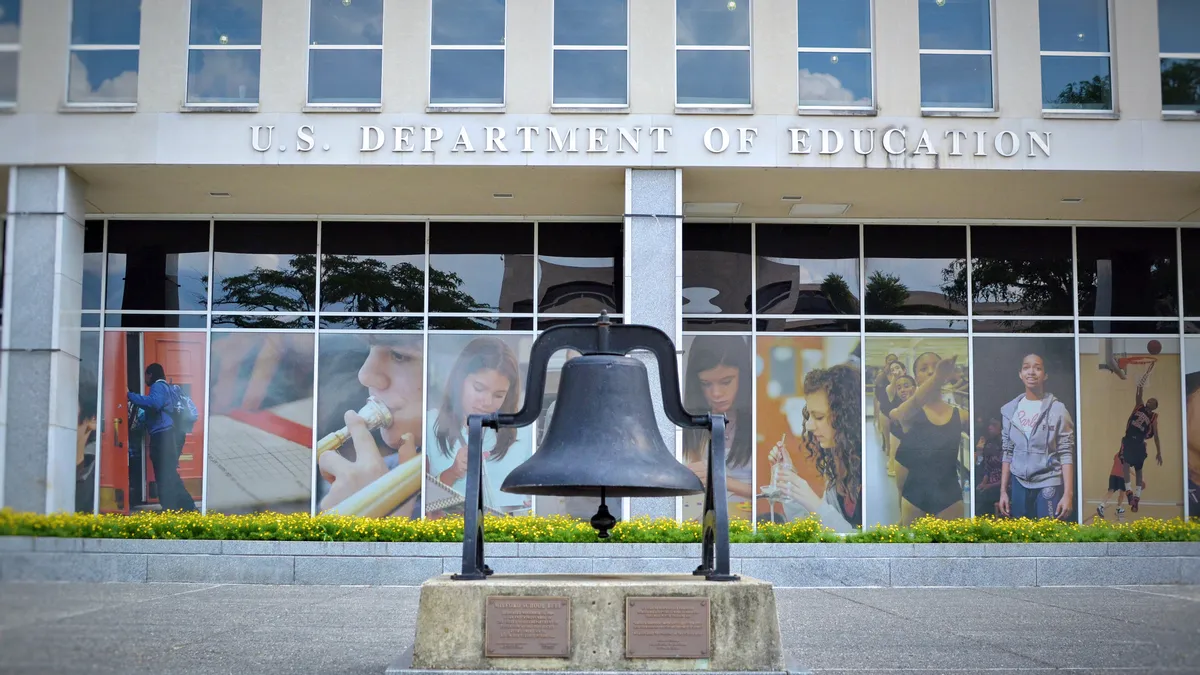The U.S. Department of Education released guidance Tuesday that could make it harder for colleges to switch accreditors — potentially setting up a clash with a new Florida law requiring the state’s public colleges to change accrediting agencies every accreditation cycle.
The guidance requires colleges to obtain the agency’s approval before they attempt to switch accreditors or else risk losing access to federal financial aid. The Ed Department will weigh several factors to ensure colleges aren’t attempting to evade oversight by changing agencies. That includes assessing whether an institution is at risk of being sanctioned by its current accreditor.
Essentially, the Ed Department must be convinced that colleges are changing accreditors to improve their quality, Cynthia Jackson-Hammond, president of the Council for Higher Education Accreditation, said in an email.
“This is an additional requirement for institutions, making the process of potentially changing accreditors very time intensive,” Jackson-Hammond said.
In a blog post announcing the guidance, the Ed Department cited the Florida law. Lawmakers there passed the accreditation law earlier this year, prompting the Ed Department to warn state officials that the policy could endanger colleges’ access to federal financial aid.
Jackson-Hammond has previously argued the Florida law will place a large burden on colleges, which will have to hire additional staff to meet the requirements of one accreditor while simultaneously applying for another. Students may have to pick up the tab, she wrote in a March letter to Florida Gov. Ron DeSantis, a Republican.
“The impact here — where Florida is requiring that institutions change accreditors every five years — is uncertain,” Jackson-Hammond said Wednesday.
Concerns over ‘accreditation-shopping’
Higher education’s accreditation system is meant to ensure that colleges provide quality education, are financially healthy and continuously improve through peer review. Without a seal of approval from federally recognized accreditors, colleges can’t receive federal financial aid.
But accreditors have long faced criticism that they aren’t providing enough oversight. And concerns abound that colleges can switch to more lenient accreditors to avoid punishment for poor student outcomes or lacking resources for education — a strategy called accreditation-shopping.
The Ed Department said its new policies are meant to prevent this type of “race to the bottom,” according to a blog post from Antoinette Flores, a senior advisor in the agency’s postsecondary education division.
The Florida law prompted the Ed Department to release the guidance, according to the post. But the guidance was also sparked by regulations issued during the Trump administration that eliminated the traditional geographical boundaries for regional accreditors, leading some agencies to expand their territories.
These changes have been “confusing to institutions and may also have a chilling effect on accrediting agencies as they seek to effectively do their job,” Flores wrote.
With a few exceptions, the Ed Department said it would not be reasonable for colleges to switch accreditors if their accreditation had been withdrawn in the past two years or if they had recently been subject to probation or other punishment.
"They must be in good standing before they’re able to switch,” said Kevin Kinser, a higher education professor at Penn State University.
Colleges are ‘caught between two masters’
Under current regulations, the Ed Department will only recognize accreditors whose colleges are voluntarily choosing to be their members.
“This voluntary association is intended to engender a willing and cooperative environment for the review and improvement of educational programs at American institutions of higher education,” the Ed Department wrote in a Tuesday letter to accrediting agencies.
However, Florida’s law “potentially undermines the voluntary nature of the relationship,” the department argued. In response, the agency is examining whether colleges are voluntarily seeking membership when they are attempting to switch accreditors. The Ed Department also said it would consider the issue of voluntary membership when deciding whether to continue recognizing accreditors.
Higher education experts say these Ed Department policies could clash with Florida’s law, though the impacts to the state’s colleges are still unknown.
The Florida law took effect this month. Lawmakers passed the bill after the Southern Association of Colleges and Schools Commission on Colleges, or SACSCOC, looked into whether political pressures have affected Florida colleges.
In one instance, the accreditor notified the University of Florida in November that it was investigating whether partisan influence affected the university’s decision to initially prohibit several professors from testifying against the state’s new restricting voting law. The accreditor recently cleared the University of Florida over the concerns, The Gainesville Sun reported.
It will now be challenging for Florida to implement its accreditation law, said Shelbe Klebs, an education policy advisor at Third Way, a left-leaning think tank.
“It does seem in direct opposition to some of the guidance here,” Klebs said.
Kinser echoed those comments, arguing the guidance sets up a showdown between the federal government and Florida. And experts say that legal challenges could be coming down the pike as colleges navigate conflicting policies.
“They’re caught between two masters,” Kinser said.






















